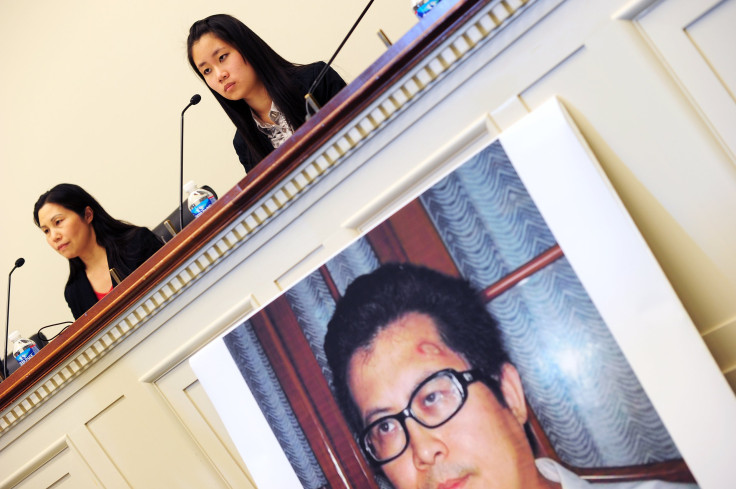China Jails Civil Rights Activist Guo Feixiong For 6 Years Over Censorship Protest

SHANGHAI -- China has jailed a leading civil rights activist for six years on charges of disturbing public order -- in part for his role in protests against censorship at a popular liberal newspaper in Guangzhou. A court in southern Guangdong province on Friday passed the sentence on 48-year-old Guo Feixiong in a hearing off-limits to foreign media, his lawyer said. Two other activists were also jailed, in what human rights groups said was a sign of a deepening crackdown on civil liberties in China.
Guo, a former university lecturer who has campaigned for greater freedoms in China for the past two decades, was detained after taking part in protests in January 2013 outside the offices of the Southern Weekly newspaper in Guangzhou. The protests were a response to the spiking of the paper's New Year’s editorial, which had called for more thorough implementation of China’s constitution, including its promise of freedom of speech for all.
Guo, whose real name is Yang Maodong, also organized a signature campaign and street demonstrations in eight cities, calling on China to ratify the U.N. International Covenant on Civil and Political Rights, which Beijing signed in 1998, but has not yet ratified. He said in a subsequent statement that his actions were designed “to promote the drafting of sound laws and the abolition of harmful ones.” However, he was accused of “gathering crowds to disturb social order,” and was detained in August 2013.
Two other activists, Liu Yuandong and Sun Desheng, were also jailed for three years and two-and-a-half years, respectively, on the same charge.
Amnesty International called for the release of the three, saying the sentences were a “clear-cut act of political persecution.” And Guo’s lawyer Zhang Lei told Reuters after the sentencing that his client “wasn't guilty of anything at all. This sentence is unacceptable and unfair."
The judge is also reported to have added a new charge against Guo at the sentencing hearing: “Picking quarrels and provoking troubles.” Activists say this vaguely worded charge has been used with increasing frequency in recent years against lawyers and other activists seen as a thorn in the side by the Chinese authorities. It was among charges brought against leading civil rights lawyer Pu Zhiqiang earlier this year. Pu is currently awaiting trial.
Guo’s lawyers have previously complained about his treatment since his detention, and about the year-long delay in passing sentence following his trial in November 2014. At one point they boycotted the case in protest against his treatment. Activists have said Guo was held in a small cell and not allowed out to exercise for 743 days, in what they said was an intentional attempt to harm his health. They say his mental faculties have been affected by the treatment.
And earlier this year, Guo accused the authorities of torturing other inmates in the Guangzhou detention center where he was held -- and in at least one case of subjecting them to sexual abuse. Amnesty International also said Guo and his fellow detainees had been subjected to torture and other forms of ill-treatment.
Guo was previously jailed for five years, and has also spoken out against harassment of his wife and daughters, who later left China for the U.S. However, he has repeatedly said it is worth being jailed to promote democracy in China, and has also gone on several high-profile hunger strikes to attract attention to this cause.
However, human rights groups say his latest jail term is a further sign that China’s leadership is in no mood to compromise on civil liberties. In the face of economic challenges and an increasing outspoken public opinion on the Internet, the authorities have taken a tough line on civil rights groups, lawyers, bloggers and journalists who they see as influencing public opinion. Maya Wang, a researcher for Human Rights Watch in Hong Kong, said in a statement on Friday that Guo’s jailing “removed another leader of the rights movement that began in '03,” when civil rights activists such as Guo and lawyers like Pu Zhiqiang began to use the fledgling Internet to link up with fellow liberals around the country.
The Chinese government has this year drawn up or introduced tough new laws on the Internet, security and NGOs -- and in the summer arrested several dozen lawyers and activists, whom it has accused of being part of a “criminal gang.” On Thursday, a court in Beijing did reduce the sentence against jailed journalist Gao Yu, from seven years to five years -- but it upheld charges of leaking state secrets. Gao's lawyers say she is innocent of the charges, which are believed to relate to the leaking of an internal Communist Party document calling for a campaign against western values including democracy and press freedom.
© Copyright IBTimes 2024. All rights reserved.






















